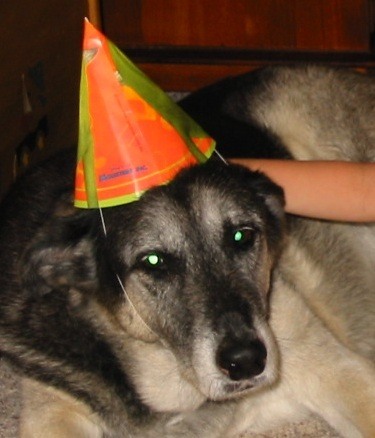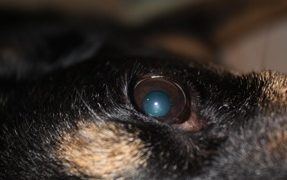“This post contains affiliate links, and I will be compensated if you make a purchase after clicking on my links.”
Dear Dr. Chris,
I have a 10 M/O Lab/Wiem mix. I am worried that she may have an eye problem. Her right eye looks normal but her left appears to have a very bright greenish reflection from the back of her eye. It does not seem to cause her any problems but worrisome none the less.
Brian, South Carolina
Hi Brian,
Having a 10 year old Weim/Lab mix can be quite an adventure. I’m sure there is no shortage of energy or entertainment in your house right now!
The green reflection you are seeing in the back of your puppy’s eye is called the tapetum lucidum. This is a normal part of the anatomy of the eye and is what is causing the green reflection you are seeing.

The tapetum lucidum is a reflective layer that causes the retina (the back of the eye) to appear green or yellow, or some color variation in between. This layer helps animals see better at night as it magnifies the amount of light and is most often noticed in animals that are nocturnal. Humans don’t have this so if you take a picture of a person, you get “red-eye” because the back of a person’s eye is filled with blood vessels with no reflective layer. If you take a picture of a dog, the reflection will appear yellow or green, in most cases.
If you are seeing different colors in the eyes of your dog, here are some possible causes:
- The tapetum lucidum may not be present in an eye that has a blue iris (pupil). This is normal and causes no harm.
- The tapetum lucidum may be more obvious in one eye if the pupil is abnormally dilated. If the pupils are the same size this isn’t a concern. If the pupils are a different size, then your canine friend should be evaluated by your veterinarian right away.
- Your puppy may have tapetal hypoplasia, a genetic defect where the tapetum is missing or underdeveloped.
- In some dogs (typically older dogs), there can be some serious causes such as progressive retinal atrophy or even a tumor, that may cause the eye to appear different.
If this is a recent change, your puppy should be examined by your veterinarian or a veterinary ophthalmologist. If she has always been this way, it is most likely due to a genetic variation which won’t affect her quality of life unless she is a hunter, foraging for food at night!
I hope this answers your question and keep taking good care of your puppy!
Sincerely,
Dr. Chris Smith
Your dog’s favorite veterinarian




















Judy dragicevic
says:My dogs right eye pupil is black as normal but his outer eyeball which was white is now brown
Deanielle Dagondon
says:Hi!
My dog’s right eye looks like its bleeding from the inside. Though he acts like there is nothing wrong . I’m really worried to death right now since yhis just happened recently after we went from the veterinarian to cut all the long nails of my dog. My dog is a 3 years old shitzu terrier. I hope you know what this and hopefully will help me.
Great information on dog eyes.
Pickles & Marahall
says:My 4yr old Irish Jack Russel Has been extremely irritable with touching on her head and back. At less than a year old she was run over by a car but survived with no broken bones. Recently I have noticed a green tint in her eyes. And this has worried me deeply! Any clues as to was has caused this sudden change?
sharlene janish
says:Take the dog to eye specialist for dogs!! The animal could have UVEITIS.My Daughters cat had an eye thing a few years ago..we caught it when we noticed the eye looked cloudy/dusty greenish a bit. we were prescribed and given a specific eye drop.dont remember if another med was prescribed.IT IS PAINFUL,CAN GET WORSE AND NEEDS TREATING!! ACT QUICKLY!!
ES
says:It is exceedingly unlikely that the dog in this question has uveitis. There is no need for them to rush to a veterinary specialist or to panic. The description was of a bright green reflection at the back of the eye that was not painful. Uveitis would cause an accumulation of inflammatory cells in the eye, visible as hypopyon in the anterior chamber (sometimes so severe it obscures the entire chamber with a greenish-yellow haze, obscuring the pupil), occasionally hemorrhage, corneal edema visible as a blue tinge to the surface of the eye, and deep corneal vascularization visible as a red ring around the cornea, at the junction between the cornea and the sclera (white part of the eye). Additionally the dog would be exhibiting behavioral changes from the pain, squinting of the eye, etc.
Furthermore, none of the causes of uveitis are particularly likely in a dog of this signalment, and the ones that are reasonably possible (such as infection) would primarily present with systemic signs of illness as well.
So no, not uveitis. Dr. Smith is correct – the description is of the tapetum lucidum, a normal anatomical structure. More interesting to me is that the question describes a unilateral tapetum lucidum, which is quite unusual. The most likely cause of this, which Dr. Smith also mentioned, is complete heterchromia iridum – two eyes of different colors, one that is likely blue and hypo pigmented, resulting in a non-pigmented retina. The lack of pigmentation over the tapetum in this eye causes a red reflection, while a green or yellow reflection occurs in the other eye that possesses melanin pigmentation.
Here is an example of this phenomenon:
en.m.wikipedia.org/wiki/File:Astrid_com_orelhonas-crop.jpg
This is great information about pets eyes
Kathy Marks Voth
says:Our 5 year old White GSD was just diagnosed with Pannus. What can we expect for a long term prognosis? Will her sight be saved with treatment? Is Pannus the tip of the iceberg with regard to other auto immune diseases for her?